Let’s make sure you get your household hazardous waste disposed of, or recycled responsibly.
You know this is the time for cleaning junk from your home. There are surely items that you want to get rid of, but you should know which items fall under HHW or Household Hazardous Waste. Thus, it will be easier for you to drop off everything in the right place.
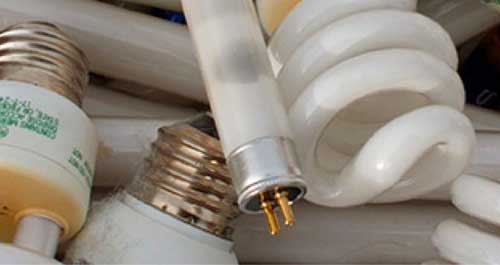
CFL light bulbs have mercury and when not appropriately managed it can cause health hazards.
Ideally, bulbs should be managed through HHW events. The EPA recommendation is to break light bulbs in plastic bags outside of trash bin.
Recycling CFLs
Because they contain a small amount of mercury, used CFLs are considered household hazardous waste. The best way to recycle old bulbs is to take them to a retailer that accepts CFLs, a household hazardous waste collection facility, or a neighborhood collection event accepting used CFLs along with other household materials such as paint, oil or pesticides. When you recycle a CFL bulb, the mercury, metal and glass can be reclaimed for use in future products.
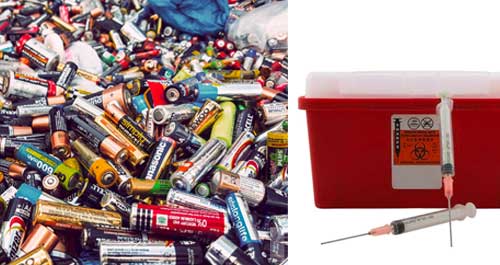
You can easily keep it as household items, but it is better to use rechargeable batteries.
Each year 10 million Americans use lancets, syringes or needles resulting in five billion disposed of sharps.
Do not place these in recycling bins for workers safety.
Instead of follow guidelines available to dispose of these.
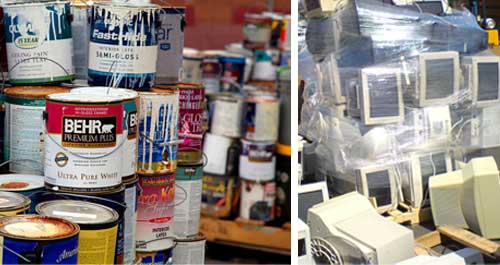
Disposing of paints depends on its type. You should drop off thinners, varnishes or oil-based paints at HHW events.
Similarly, for non-hazardous latex paints, you do not need to bother but recycle cans.
Your state may have laws for e-waste. Before you recycle old computers, TV or mobile devices, ask friends if they need it or try to sell it online.
Otherwise, wait for an e-waste collection event or find retailers around who accept e-waste for recycling. See Free Geek.
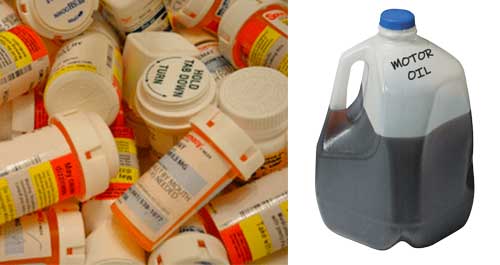
Do not flush medicine or other pharmaceuticals down the drain. Water treatment facilities can barely separate chemicals from water.
To dispose of expired medicine use undesired substances like coffee grounds, or find another way to discard safely.
Your used motor oil and filters can be recycled and reprocessed for another use.
Bring your motor oil to municipal collection sites or garages for disposing of.
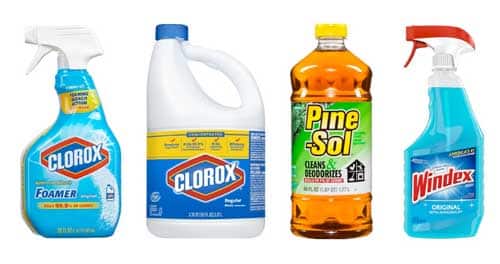
Do not buy chemicals, bleach or other cleaners that you do not use. Recycle empty containers and you can also share cleaners with neighbors before bringing all to the HHW event.
To dispose of expired medicine use undesired substances like coffee grounds, or find another way to discard safely.
Our junk removal crews are always at your service.
Where You Can Recycle, Or Dispose Of HHW or Household Hazardous Waste
Lithium-ion batteries
Lithium-ion batteries are rechargeable batteries like the ones in many cell phones and computers. Never throw lithium-ion batteries in the garbage. These batteries can cause fires.
Best: Several retailers accept lithium-ion batteries for recycling. Check the Call2Recycle website to find a location near you.
Second best: Take to a hazardous waste facility or collection event.
Nickel cadmium, mercury-oxide and silver-oxide button batteries
Never throw nickel cadmium, mercury-oxide and silver-oxide button batteries in the garbage.
Best: Recycle. Many stores that sell rechargeable nickel cadmium batteries will take them back for recycling. Mercury-oxide and silver-oxide button batteries are sometimes collected by jewelers, pharmacies, hospitals and hearing aid stores for shipping to companies that reclaim the metals.
Second best: Take to a hazardous waste facility or collection event.
Common household alkaline and carbon-zinc batteries
Best: Take to a hazardous waste facility or collection event.
Second best: Several retailers accept household batteries for proper disposal. Regular AA, AAA, C and D alkaline batteries are no longer manufactured with mercury, but other batteries still release toxic heavy metals that pollute air and water.
For more details on battery disposal options, search Metro’s online directory or call the Recycling Information Center at 503-234-3000.
Alternatives
- Buy rechargeable batteries.
- Consider alternatives to battery-operated products.
Retailers
Customers can bring used, unbroken CFLs to any Home Depot location for recycling. Look for orange recycling bins near the store’s returns desk.
With recycling bins near the exit of each store, customers can recycle used, unbroken CFLs at every IKEA location.
Recycling centers are located near the customer service desk at every Lowe’s location where customers can recycle any used, unbroken CFLs.
Portland Metro Area
Metro Central Station
Household Hazardous Waste Facility 6161 NW 61st Ave., Portland
Metro South Station
Household Hazardous Waste Facility 2001 Washington St., Oregon City Call Metro Recycling Information at 503.234.3000 or visit Metro’s website for details.
Note: There is a $5 fee to drop off household hazardous waste at a collection facility. However, Metro also offers free household hazardous waste collection events that may accept CFLs for recycling.
It’s against the law to throw syringes in the garbage. Instead, drop discarded syringes and sharps containers at any of the free 24-hour sharps drop boxes listed below, or take them to a Metro Household Hazardous Waste Facility.
Do not dispose of medical sharps or other waste in syringe disposal boxes intended for community disposal. If you have questions about medical waste disposal or find an illegal dump(link is external) on public property, contact Metro(link is external) at 503-234-3000. If you find discarded syringes in Portland’s city center and don’t feel comfortable picking it up, call Downtown Clean & Safe(link is external) at 503-224-7383 to report the waste.
Free 24-hour syringe drop boxes
- Waterfront Park Esplanade(link is external), under the west side Burnside Bridge
- Multnomah County Building(link is external), 501 SE Hawthorne Blvd, Portland
- Multnomah County Bridge Shop(link is external), 1403 SE Water Ave, Portland
- Belmont Library Parking Lot(link is external), 1038 SE Cesar Estrada Chavez Blvd.
- Holgate Library parking lot(link is external), 7905 SE Holgate Blvd, Portland
- Midland Library parking lot(link is external), 805 SE 122nd Ave, Portland
- Oregon Clinic(link is external), near Gateway Transit Center, NE Multnomah and 99th Ave.
- St. Johns Fire Station(link is external), 7205 North Alta St., Portland
- Lents Fire Station(link is external), 5707 SE 92nd Ave., Portland
- Clackamas Service Center(link is external), 8800 SE 80th Ave.
- North by Northeast Community Health Center(link is external), 714 NE Alberta St.
- Woodstock Fire Station(link is external), 5211 SE Mall St., Portland
- Multnomah Village Fire Station(link is external), 8720 SW 30th Ave.
- Francis and Clare Commons(link is external), SE 11th Ave. and SE Oak St.
- Transition Projects(link is external), on NW Irving, between NW 6th Ave. and Broadway
- Greyhound bus station(link is external), NW Glisan St., between NW 5th and 6th Avenues
- SW 2nd Ave and Ash St.(link is external), near Skidmore Fountain
- NW Davis St.(link is external), Between NW 4th and 5th Avenues
Other syringe drop sites
Metro accepts all discarded syringes, including medical waste. Do not dispose of household medical sharps or other waste in syringe disposal boxes intended for community disposal. For households where syringes are used, place syringes in a sharps container and take them to a hazardous waste center:
-
Metro Central(link is external) at 6161 NW 61st Ave(link is external)., Portland
-
Metro South(link is external) at 2001 Washington St(link is external)., Oregon City
A $5 hazardous waste fee for up to 35 gallons is required at Metro facilities. Enroll in the Metro syringe disposal program for $5 and get a free sharps container each time you return one.
Group homes, residential care facilities and other commercial or business customers should contact a medical waste management company, their garbage hauler or Metro’s recycling hotline for disposal options.
If you have questions about medical waste disposal, contact Metro(link is external) at 503-234-3000.
Have leftover paint?
Recycle up to 35 gallons of paint per day for free at Metro Central, Metro South and MetroPaint’s Swan Island location. Paint labeled “architectural coatings” (also known as “house paint”) from any Oregon-based business or residence is accepted.
The following materials can’t be accepted at the MetroPaint retail location:
- paint containers missing original labels
- automotive paint
- industrial coatings
- road paint
- marine coatings
- epoxy coatings
- equipment paint
- spray paint
- adhesives
- roof coatings
- caulking
- linseed oil
- paint thinner or turpentine
- other solvents
Many of these items are hazardous. Make sure you dispose of them safely. Ask an expert how or visit Metro’s online database for disposal options near you.
Beginning March 1, 2022 there will be changes to the Oregon E-Cycles collection network that will affect drop-off locations in some counties. To view the most current list of sites near you, please search using the “Locate Now” tool or by calling the Oregon E-Cycles Hotline: 1-888-532-9253.
Leftover or expired drugs can pose a number of serious environmental and health risks. If not disposed, unused drugs can lead to accidental poisonings, addiction or abuse. Drugs can also have health and environmental impacts when they end up in a landfill or are flushed down the toilet or drain. Wastewater treatment plants and septic systems are usually not equipped to treat pharmaceuticals and chemical compounds from these drugs can pass through treatment plants or septic systems to our rivers or groundwater.
Disposal recommendations for household pharmaceuticals
 Do not dispose of pharmaceuticals down a drain or toilet or burn them with household waste. Instead, choose one of these options:
Do not dispose of pharmaceuticals down a drain or toilet or burn them with household waste. Instead, choose one of these options:Option 1
Dispose of unwanted pharmaceuticals at a designated drug take-back collection site, through free mail-back service, or at a collection event.
Collection sites and mail-in options:
Find a collection site to drop off unwanted medicines in-person, or get a prepaid and preaddressed envelope to mail in your unwanted medicines, through the Oregon Drug Take-Back Program here:
- Website: medtakebackoregon.org
- Toll-Free Telephone: 844-482-5322
You may also check the DEA website and possibly your local jurisdiction for other collection sites.
Collection events:
The U.S. Drug Enforcement Agency usually holds annual drug take-back events in April and October for National Prescription Drug Take-Back Day.
Option 2
If no sites or events are available, dispose of waste pharmaceuticals in the trash using these basic guidelines:
-
Take waste pharmaceuticals out of their original containers and mix with an undesirable substance such as used cat litter, or coffee grounds.
-
Place this mixture in a plastic bag or other sealable container, such as an empty plastic container.
-
Place the sealed container with the mixture in the trash as close to garbage pickup time as possible, to prevent theft and misuse.
Contact
Michael Lee, 503-229-6832
Drug Take-Back Program Coordinator
Visit DEQ’s Drug Take-Back page to learn more about this program
Common hazardous ingredients
Petroleum hydrocarbons. Used motor oil can contain polynuclear aromatic hydrocarbons, chromium, lead and other metals.
Potential hazards
Flammable; toxic. Can be absorbed through skin contact. Long-term health effects from toxic heavy metals such as lead. Environmental pollution of surface or groundwater when disposed of by pouring down a storm drain, into a drainage ditch or on the ground.
Use
Wear nitrile gloves. Drain used crankcase oil into a metal or plastic catch pan. Avoid using absorbent “easy-change” boxes, since oil cannot be recycled once in these boxes. Remove old oil filter, turn upside down and drain overnight into oil catch pan. Do not mix carburetor cleaner, solvents, antifreeze, brake fluid, degreaser or gasoline with used motor oil.
Storage
Store away from children, pets and sources of flames.
Disposal
Used oil: In Clackamas, Multnomah and Washington counties, if you live in a home ranging in size from a single-family residence to a four-plex, you can set out motor oil at the curb in a well-rinsed, transparent, non-breakable container with a screw-on lid (milk jugs work well). No containers larger than 1 gallon.
If you have containers larger than 1 gallon, or if you live in an apartment building with more than four units, search Metro’s online database for recycling options near you.
Elsewhere in Oregon, call your garbage hauler, recycling center, local government solid waste department or your regional DEQ office.
Oil filters: Contact your local scrap metal recycler to see who will accept your well-drained oil filter or take to a hazardous waste facility or collection event.
Alternatives
Purchase re-refined oil or have your oil changed at a service station that has its oil recycled.
If you have unwanted hazardous products that you are not able to give away, dispose of them responsibly. Many take them to a household hazardous waste collection site. For information about collection sites in the Portland metropolitan area, call Metro Recycling Information at 503-234-3000. Outside the Portland area, call your garbage hauler or local government solid waste department. Visit our listings of locally-sponsored HHW programs and collection events or call the statewide HHW hotline at 1-800-732-9253.
Properly prepare household hazardous wastes for transport to a collection site.
- Keep products in original containers when possible. If a product does not have its original label, label it yourself if you are sure of the contents.
- Don’t mix products together. Dangerous reactions can occur when some materials are mixed.
- Make sure products are properly sealed to prevent leaks and spills. If a container is leaking, secure it inside a second leak-proof container.
- Pack containers in sturdy boxes in the trunk of your vehicle, away from the driver, passengers and pets.
